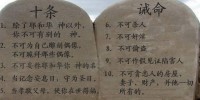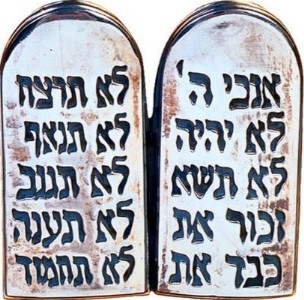 出埃及記第十一課:十誡(一):出埃及記20章
出埃及記第十一課:十誡(一):出埃及記20章
摩西是聖經里的重要人物之一;“十誡”是中外歷史中最有名的律法之一。也許以下的分析會讓您認識摩西更深而明白“十誡”的意思和重要性。
一。出埃及記20:1-17:《十條誡命》:此章節是舊約里最重要的部分之一。十誡是舊約律法的基礎,是神對以色列人之要求的標準,是有罪之人接觸無罪之神的途徑。十條誡命的每一條是其他在舊約里之法律的根基。每一條表示神要以色列人明白的原則。頭四個誡命是人對神所當負的責任;第五條至第十條包括人對人當負的責任。
二。出埃及記20:1-2:
“神吩咐這一切的話”:參看出埃及記31:18: (1)神發言說話;摩西聽得出聲音。 (2)神寫字(刻字)在石板上。
“話”:十條誡命的不同名稱是:“兩塊法版”(出埃及記31:18);“十條誡” (出埃及記34:28;申命記4:13,10:4);十條。(新譯本翻為“十條誡命”。)希伯來原文意為“十字”。今天的簡寫就是“十誡”。
“我是耶和華你的神,曾將你從埃及地為奴之家領出來”:以此句話,神宣布以色列人屬於他。神說他有擁有權向以色列人要求以下的誡命。神以“曾將你從埃及地為奴之家領出來”為理由要求他們遵守這些誡命。神是“王”;以色列人是他的臣民,他們自願的臣服神。
“我是耶和華”的原文就是本套教材的第二課所介紹的希臘字。(請複習出埃及記3:14。)十誡的意義來自這個事實,就是十誡是那位“自有永有”的神頒布的。
“你”:請注意:“你”,而不是你們;原文是單數的,不是複數的。每一個人要個別的接受並遵守此約。這樣看來,沒有任何人有權力為所欲為。
 三。出埃及記20:3:第一條誡命:“除了我以外,你不可有別的神”。
三。出埃及記20:3:第一條誡命:“除了我以外,你不可有別的神”。
肯定:“一神論”。
否認和禁止:“多神論”,“不可知論”,“精靈論”,“唯物論”,“人本主義”,“自然神論”等。
命令:要相信神的存在,神的權柄。人要敬畏、懼怕並順服神。
原則:在人的生命上,神要居首位;人要把神高舉在他的生命當中。
今天:你如何把此誡命用在自己日常生活上?
四。出埃及記20:4-6:第二條誡命:“不可為自己雕刻偶象…”。
肯定:神是獨一無二的真神;沒有任何“物”能夠代表神。任何雕刻或畫像只能限制神(只能限制人對神的觀念)。
否認和禁止:為了尊榮或敬拜的緣故而製造偶像(包括真神假神在內)。不可以敬拜假神。(我認為此誡命不禁止跟敬拜無關的美術雕刻和畫像。)
命令:要敬拜真神;只要敬拜真神;要以正確的方法敬拜真神。
原則:神不讓世人把他應該得到的尊榮拿去給別的“神”(神明、東西、人物等)。
“我耶和華你的神,是忌邪的神”:“神專心建立他至高無上的權力。神不容忍任何偶像,因為偶像讓人分裂他對神的忠誠” (Thompson)。意思是神不容忍屬於他的人去敬拜偶像,如同你我不容忍配偶把他(她)的愛分給別人。
今天:你如何把此誡命用在自己日常生活上?
五。出埃及記20:7:第三條誡命:“不可妄稱耶和華你神的名”。
肯定:神的名字是神聖的。(參看利未記24:15-16。)
否認和禁止:不可以提神的名字發誓證明謊言為真實。不可以假借神的名來支持和擁護一個謊話或誓言。
命令:要尊重和敬畏神。連他的名字都是神聖的。猶太人發誓時,話必須是真實的;請參看申命記6:13。
原則:要敬畏神、敬畏神的權威、神的權柄和神的話(《聖經》)。
今天:你如何把此誡命用在自己日常生活上?
六。出埃及記20:8-11:第四條誡命:“當記念安息日,守為聖日”。
肯定:神把一些日子定為“聖日”。神命令猶太人守星期六為聖日。
否認和禁止:禁止猶太人在安息日工作。
命令:猶太人要遵守神的安息日(參看出埃及記31:12-17)。
原則:(1)神對人的時間有一份權力;神有權柄管理人,么樣使用他的時間。(2)人需要休息。(3)人需要紀念某些事。(4)人們有責任安排時間敬拜神。
今天:你如何把此誡命用在自己日常生活上?
讀者:歡迎您把這篇短文下載,複印,用在您的《聖經》班裡。
Bible Study Questions: Exodus Lesson Eleven
Exodus 20: The Ten Commandments /01
1. Ex. 20:1-17: “The Ten Commandments”: This chapter is one of the most important in the Old Testament. The Ten Commandments are the foundation of the laws in the Old Testament, they are the standard of God’s requirements for the Israelites and are the route by which sinful men can make contact with a sinless God. Each of the Ten Commandments is the foundation upon which other Old Testament laws are built. Each commandment expresses principles that God wanted the Israelites to understand. The first four commands are man’s responsibility to God; numbers five through ten are man’s responsibility to man.
2. Ex. 20:1-2: “God spoke all these words”: See Ex. 31:18: (1) God voice was audible. (2) God wrote (inscribed) words on stone tablets. “Words”: Other names for the Ten Commandments: “tablets of the Testimony” (Ex. 31:18); Ten Commands” (Ex. 34:28; Deut. 4:13, 10:4). [The New Chinese Translation is a bit different from the Union Version.] The original Hebrew is the “Ten Words.” “I am the LORD your God, who brought you out of Egypt, out of the land of slavery”: With this sentence, God claims the Israelites as his own. God says that he has authority of possession to make the commands that follow. The statement, “who brought you out of Egypt, out of the land of slavery,” is reason God can require them to obey these commands. God is the “king”; the Israelites are his subjects and they willingly obey God. In the original language, “I am the LORD your God,” is the Hebrew term introduced in Lesson Two of this series. (Please review Ex. 3:14.) The significance of the Ten Commandments comes from this fact, i.e., because the Ten Commandments are promulgated by the God who is the “I AM.” “You”: Note that “you” is singular not plural. Each person was to accept these commands as an individual and then obey them. In this way, no one had the right to go his own way and do whatever he wanted.
3. Ex. 20:3: The First Commandment: “You shall have no other gods before me.” Affirms: Monotheism. Condemns and prohibits: Polytheism, agnosticism, animism, materialism, humanism, naturalism, etc. Commands: Belief in God’s existence and power; man should fear and obey God. Principle: God must be given first place in man’s life; man must give God first place.
4. Ex. 20:4-6: The Second “Commandment: “You shall not make for yourself an idol…” Affirms: God is the one and only God; no “item” can represent God. Any carved image or painting only limits God (such can only limit man’s concept of God). Condemns and prohibits: The carving or painting of any idol for the purpose of veneration or worship (includes both the real God and false gods). Worship of false gods is not allowed. (I believe this command does not prohibit sculpted and painted artful expression when worship is neither involved or intended.) Commands: Worship of the true God; worship only the true God; worship the true God in a correct way. Principle: God does not allow man to give to any other “god” the veneration that is due him (the true God). ”I, the LORD your God, am a jealous God”: “God is actively engaged in the establishment of his own sovereignty; [God] will not tolerate idolatry in any form since this amounts to divided allegiance” [Thompson]. This means that God does not allow those who belong to him to worship idols, just like you and I do not tolerate our spouse giving his/her love to another person.
5. Ex. 20:7: The Third Commandment: “You shall not misuse the name of the LORD your God”: Affirms: God’s name is holy. (See Leviticus 24:15-16.) Condemns and prohibits: Cannot use God’s name to swear as true something that is false. Cannot misuse God’s name to support a lie or oath. Commands: Respect and reverence God’s name. Even his name is holy. Whenever Israelites swore, their words should be truthful; see Deut. 6:13. Principle: Respect God, his authority, his power and his Word (the Bible).
6. Ex. 20:8-11: The Fourth Commandment: “Remember the Sabbath day by keeping it holy…” Affirms: God set aside some days as “holy days.” God commanded the Jews to observe Saturday as a holy day. Condemns and prohibits: Jews were to do no work on the Sabbath. Commands: Jews are to observe God’s Sabbaths (see Exodus 31:12-17). Principles: (1) God has a right to man’s time; God has authority to control man’s use of his time. (2) Man needs to rest. (3) Man needs to remember some events. (4) Man has the responsibility to appropriate time to worship God.
本課之部分資料來自Thomas Warren博士。他是我研究所的倫理教授。Some of the material in this lesson is based on class notes I took when studying Ethics in graduate school under Dr. Thomas Warren. 我記得Warren博士時常提到The Master Bible。Dr. Warren made reference to The Master Bible which he seemed to like very much.
聖經問答
出埃及記第十一課:十誡(一):出埃及記20章
Bible Study Questions: Exodus Lesson Eleven
Exodus 20: The Ten Commandments /01
作者:謝德華 ©By Edward Short
本文所問的問題使用漢子聖經。
歡迎您把此文下載用在聖經班或私人學習。
A series of Bible lessons, written in Chinese
and based largely on the text of the Chinese Bible.
You may download and print copies of this lesson
for use in your Bible class.
World Christian Broadcasting
Franklin, TN 37067 USA
